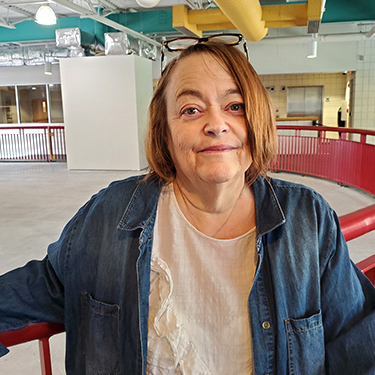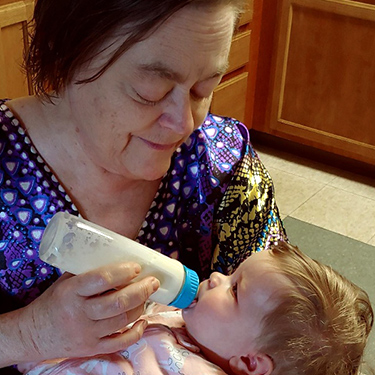Intensive Treatment Wipes Out Persistent Uterine Cancer
 Living near the rain forests of Belize in her 40s, Karen Brustman was on a mission to share her faith and help impoverished children. In her 60s, she’s been on another mission to encourage people in war-torn Ukraine. But during those in-between years, her mission was personal – saving herself from the ravages of persistent uterine (endometrial) cancer. Treated by “compassionate and thinking” doctors at Henry Ford Hospital, now Karen works to educate women about the serious disease.
Living near the rain forests of Belize in her 40s, Karen Brustman was on a mission to share her faith and help impoverished children. In her 60s, she’s been on another mission to encourage people in war-torn Ukraine. But during those in-between years, her mission was personal – saving herself from the ravages of persistent uterine (endometrial) cancer. Treated by “compassionate and thinking” doctors at Henry Ford Hospital, now Karen works to educate women about the serious disease.
In 2015, it was the bleeding and intense cramping that sent Karen to Henry Ford, and it was the pap smear and subsequent tests that showed early stage cancer in her uterus. At Henry Ford, she underwent a total hysterectomy.
“A lot of nights, I cried myself to sleep,” says Karen who has two adult daughters.
Our team of uterine cancer experts work together to ensure you receive an accurate diagnosis and treatment plan based on your unique needs. Meet the Team.
Cancer recurrence
Sadly, about two years later, the cancer recurred in her upper vagina and bladder, and she received pelvic radiation treatments with chemotherapy.
“I got really sick from the chemo. I couldn’t eat and I lost my taste,” says Karen. “You just have to learn to live with the side effects.”
“Unfortunately, the original tumor did not respond completely, and then she was diagnosed with a persistent tumor in the bladder,” says Mohamed Elshaikh, M.D., director of Gynecologic Radiation Oncology. “In the U.S. and Europe, uterine cancer is the most common type of gynecologic cancer. But the location of the recurrence in the bladder is not very common.”
Choosing life
“I’ll never forget one of my doctors telling me I had two choices – have surgery or let the cancer slowly progress,” says Karen. “I chose surgery. I chose life. I couldn’t let cancer define who I am. That was huge. I had to listen to what I wanted to do, not listen to friends and family who worried about me. I was determined to win this battle. And I decided not to cry, but to accept my diagnosis, stand up and be independent.”
To treat the relentless disease, Karen underwent an 8-hour major surgical procedure to remove the persistent tumor, vagina, bladder, sigmoid colon, and part of her rectum. Then two stomas, or openings, were created so that intestinal waste and urine could leave her body.
“I had no control over my bowels and urine. But the treatment got rid of the cancer,” says Karen.
Not long after the surgery, her condition was complicated when she developed a pelvic abscess, which was treated by intravenous antibiotics, says Dr. Elshaikh who is a member of certain national committees that develop gynecologic cancer treatment guidelines for physicians.
Finding hope in all the right places
 For Karen, solace and hope came from her faith and visits with church friends. In addition, volunteers from Henry Ford’s Spiritual Care Department came to her hospital room and prayed with her.
For Karen, solace and hope came from her faith and visits with church friends. In addition, volunteers from Henry Ford’s Spiritual Care Department came to her hospital room and prayed with her.
“That helped me get through all this,” says Karen who has two master’s degrees in pastoral ministry and was a volunteer at Henry Ford’s Spiritual Care Department for two years.
“Plus, I knew I was in good hands with the best doctors. They showed respect for me and other patients. They were compassionate and thinking before answering my questions. I grew very fond of the medical team and nurses on nearly every floor, including ICU. They were so supportive and easy to talk to,” she says.
Karen’s ordeal gave her a jump start on a life of extreme gratitude. “Now I stop and smell the roses. Relationships are more important to me. I’m glad to be alive and hold my granddaughter,” says Karen. “Life is too precious to not try to do everything to live a bit longer. I still have concerns about recurrence, but it has never happened. I’m blessed, and I live life one day at a time.”
Currently residing in an independent living center in Mexican Town, Karen enjoys nurturing plants in her lush indoor garden, and she visits with neighbors. “I like people of all cultures,” says Karen who attends art therapy classes in Henry Ford’s ExCITE Program.
She also receives weekly physical therapy and acupuncture for residual incisional pain. Even though she uses a wheelchair, the fiercely independent Karen recently took a train trip alone to Chicago to visit her granddaughter.
Advice for others
Karen advises patients to do research about cancer symptoms and find a good doctor. Don’t let the symptoms fester. Get good support from medical providers who have knowledge about cancer because distraught family members may not understand the disease, making decisions more difficult. Also, check the Spiritual Care Department at Henry Ford Hospital.
“They’re wonderful,” says Karen.
Karen’s future
These days, she’s organizing a 5K run for women to promote research and screening for uterine cancer, and she plans to move near her granddaughter in Wisconsin. Overall, she may be working on one of her greatest missions – to live each day to the fullest.
.svg?iar=0&hash=F6049510E33E4E6D8196C26CCC0A64A4)

/hfh-logo-main--white.svg?iar=0&hash=ED491CBFADFB7670FAE94559C98D7798)